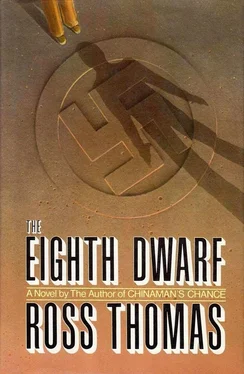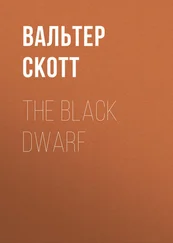The dwarf smiled knowingly. “Eleven thousand from — shall we say — the soon-to-be state of Israel. Do I hear twelve?”
“Twelve,” Baker-Bates said.
“Fourteen,” Orr said promptly.
Baker-Bates did his multiplication. With the pound at $4.03, he decided to bid his limit and get it over with. “Sixteen thousand,” he said. To himself he added, And you can bloody well take it or leave it.
“Eighteen,” Leah Oppenheimer said.
“Twenty thousand,” Orr said.
There was a silence. Ploscaru nodded genially and said, “We have twenty thousand dollars bid, ladies and gentlemen. Do I hear twenty-five?”
The silence continued. “Come, now, ladies and gentlemen, we’re not going to let this valuable item go for a mere twenty thousand, are we? Do I hear twenty-five?”
Eva Scheel drew in her breath, held it, let it out, and said in a low, almost defiant tone, “Twenty-five thousand.”
Leah Oppenheimer turned and stared at her. Eva Scheel refused to meet her gaze. Four chairs away, Lieutenant Meyer looked ill. “Jesus Christ,” he said.
“We have twenty-five thousand from the lady in the fur coat,” Ploscaru said. “You’re representing whom, my dear?”
Eva Scheel said nothing but instead stared straight ahead.
“My word,” the dwarf said, looking with feigned horror at Orr. “Do you think she might be representing our comrades to the east?”
“Thirty thousand,” Orr said quickly.
“We have thirty thousand from Uncle Sam,” Ploscaru said with a delighted smile. “Do I hear thirty-five?”
“Thirty-five,” Leah Oppenheimer said. She was still staring at Eva Scheel. “You could have told me, Eva,” she said sadly. “I would have understood. Whatever it is you’re doing, I know I would have understood.”
Eva Scheel said nothing.
“We have thirty-five thousand bid,” Ploscaru said. “Thirty-five. Do I hear forty?”
“Forty,” Orr said.
“Forty thousand is bid, ladies and gentlemen. Forty thousand dollars. Do I hear forty-five?”
There was another silence.
“Do I hear forty-five thousand?” Ploscaru said again.
There were no bids.
“Forty thousand once,” Ploscaru said, and paused. “Forty thousand twice.” He paused again, then rapped with the water glass, smiled broadly, and said, “Sold, American,” just as Minor Jackson entered the room leading Kurt Oppenheimer by the hand.
Oppenheimer, dressed only in Jackson’s topcoat, smiled foolishly, chuckled wisely, and began urinating on the floor.
By noon that day in Bonn, the following events had taken place:
The British Army had locked Kurt Oppenheimer away in a quiet, dim room.
Maj. Gilbert Baker-Bates had almost succeeded in persuading Eva Scheel to turn double agent and was confident of turning her all the way around right after the splendid lunch that he had ordered for both of them.
Lt. LaFollette Meyer had decided not to kill himself after all, but to get drunk instead, up in his room alone, which he was now doing.
Leah Oppenheimer had caught a train for Frankfurt without saying goodbye to anybody, her destination Marseille, where she would board a ship that ultimately would land her in Palestine.
And Nicolae Ploscaru had drunk three glasses of gin alone in the hotel bar and was contemplating a fourth when Robert Henry Orr, still wearing his raccoon coat, dropped heavily into the chair across the table from him.
“Well, Nick, getting quietly drunk, I see.”
“Quietly,” Ploscaru agreed.
“On what?”
“Some kind of gin. It’s all they have.”
“Then that’s what we’ll drink,” Orr said cheerfully, and signaled the bartender for another round.
After the drinks came, Orr shrugged out of his raccoon coat “You know,” he said, “the whole thing was really quite clever, almost brilliant. Too bad the poor bastard was mad.”
“Yes,” Ploscaru said, sipping his gin. “Too bad.”
“What’re your plans?”
“At this particular moment? None.”
“Things are moving in Washington, you know.”
“Oh?”
“Yes. Not this year, but next, we should have our own new shop open for business. Interested?”
“In what?”
“Piecework between now and then. We’d pay you a fair price. Afterward, when the new shop opens up, we could arrange something more permanent — and profitable.”
“What’re they going to call it — your new shop?”
“The National Intelligence Agency, I think — although that’s not firm yet. Some don’t feel that National’s quite right. Makes it sound too much like a bank.”
“I’ll think about it,” Ploscaru said.
“Do that, Nick,” Orr said, draining his drink. “I’ll be around for a few days.”
When Minor Jackson came down from his room with his bag an hour later to check out of the hotel, the dwarf was standing in the lobby. Jackson could Ploscaru was rather drunk.
The dwarf bowed gravely. “I am here to offer my apologies.”
“Get the fuck out of my way, Nick, or I’ll step on you.”
Ploscaru sighed. “And rightly so, too.” He spread his hands. “What more can I say?”
“Nothing.”
“You’re off, then?”
“That’s right.”
“May I ask your destination?”
“Amsterdam.”
The dwarf looked puzzled. “Amsterdam. Why Amsterdam?”
“It’s where they buy diamonds.”
The dwarf brightened at the scent of profit, but only for a moment. “I don’t suppose—”
“No,” Jackson said, turned, and started for the desk.
“Minor.”
Jackson turned back. The dwarf was standing alone is the center of the lobby. He looked very small. He licked his lips as if trying to think of what he wanted and needed to say. But no words came. Instead, he unconsciously began to brush some imaginary crumbs from his palms. He’s begging, Jackson thought. He’s standing there alone and as naked as he’ll ever be and begging, except that he doesn’t really know how to do it.
“Oh, shit,” Jackson said. “Get in the car.”
The dwarf beamed. “I’ll just get my bag.” Suddenly, Ploscaru was full of plans “After Amsterdam, you know where we’ll go, don’t you?”
“Where?”
“Cannes. We’ll drive down to Cannes and lie on the beach and drink wine and look at women. Now, doesn’t that sound splendid?”
“Sure,” Minor Jackson said. “Splendid.”












